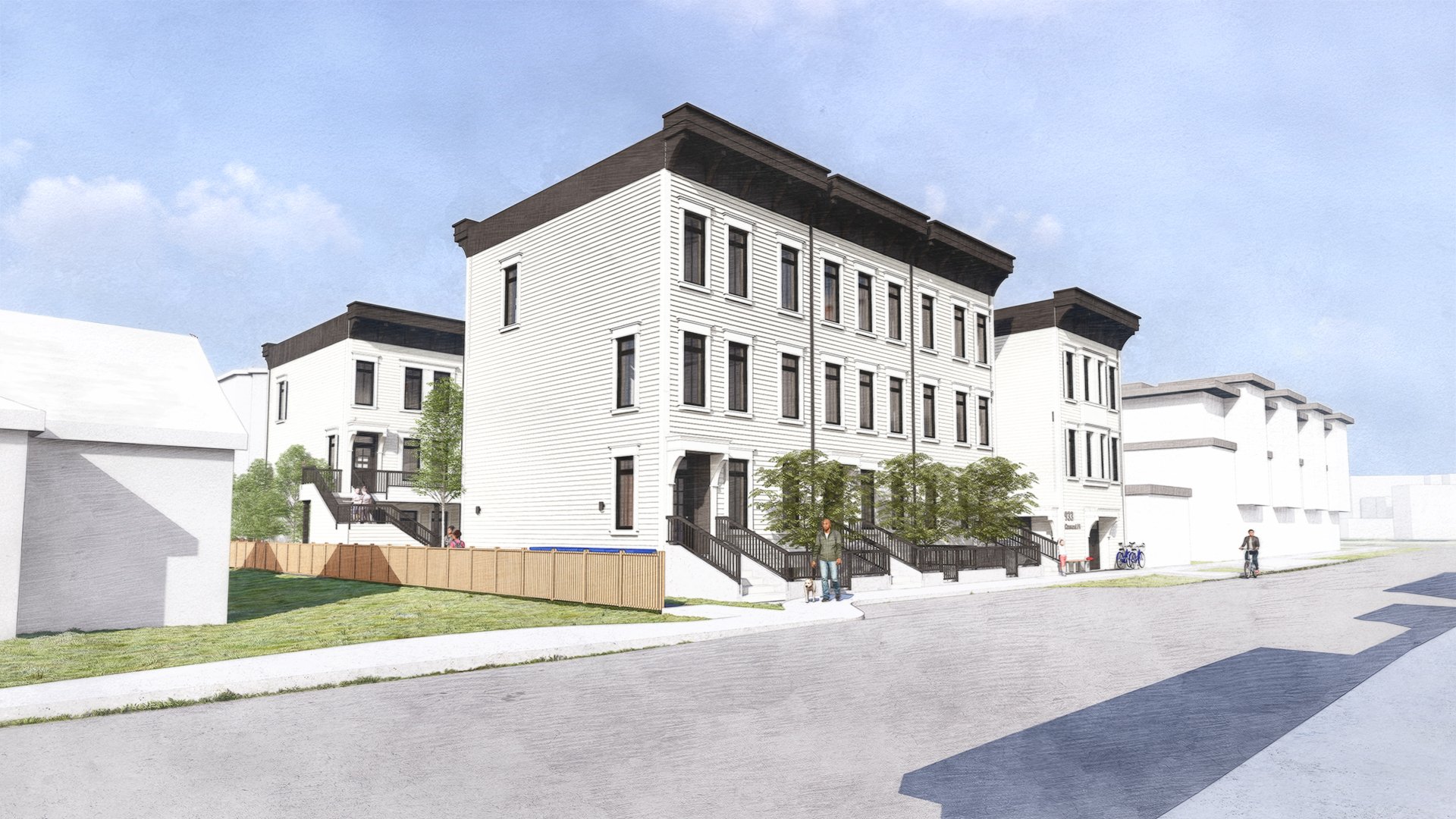
Community Page
- 933/935 Convent Place -
Hey Neighbour!
Thanks for stopping by. We are honored to help shape a small part of the neighbourhood’s future and this page is your one-stop-shop for community information. If you can’t find what you’re looking for, don’t hesitate to contact us!
Looking for the project main page? Go here!
Quick Updates
On September 23, a Community Meeting was hosted with the Fairfield Gonzales Community Association at 1330 Fairfield Road. The Community Association will post a summary report of the session soon.
On September 25, our proposal was presented to the Advisory Design Panel which received unanimous support.
*Note, on November 8th or 9th, filming will take place at 933/935 Convent Place for a TV series. This is a 1 day affair, and unrelated to our development application.

FAQs
-
Urban Thrive Developments and Lapis Homes stepped into managing the project in late 2023. We are social enterprise housing developers and, unlike many developers, we follow a very specific and disciplined approach to housing development that’s aligned to our company ethos. All of our projects and every design choice we make can be understood by these 5 guiding design principles:
Tailored to the car-free lifestyle
Minimize environmental footprint
Community centric design
Family and mixed generational housing
Geared towards middle income households
We believe these principles are best achieved through smaller scale and ground-orientated housing. Each of our projects follow these same principles, tailored to the unique context of each site. The location at Convent Place perfectly fits the type of housing and lifestyle we aim to achieve in our developments. We are deeply honoured to have the opportunity to realize our values and introduce new homes to Fairfield.
-
In essence, it comes down to economies of scale. Many of our costs are fixed or semi-fixed, meaning they remain constant or change only slightly, regardless of the number of homes provided. These costs include architecture fees, engineering fees, professional fees (such as arborist, surveyor, geotechnical), municipal fees, land costs, and administrative expenses—all of which are fixed or semi-fixed.
We have 18 homes in our proposal. If we provided townhomes with garages, we would be able to fit maybe 9 homes…. So all those fixed and semi-fixed costs are divided by 18 instead of 9, giving us better economics of scale. The “opportunity cost” of parking is what makes it so expensive - because it directly competes with housing for people and other better uses.
Realistically, for a 9-unit townhouse development with parking to be financially viable in a location like this, the homes would need to be large and luxurious. Those added costs need to be recovered somehow.
However, for an apples-to-apples comparison, we conservatively estimate that one of our 3-bedroom homes will be $50,000-$100,000 less than a comparable home with parking (assuming same size and features).
Not only that, our design prioritizes green space over pavement, reducing heat island effects, traffic, congestion, and air pollution. We're offering an incredible courtyard and a community-centric design while promoting safer, healthier streets. In the end, eliminating parking allows us to deliver more value for less—and that’s simply smart design.
-
Lots of people! Including me (Julian West).
It’s well established that in well-connected communities with strong transportation alternatives, car ownership and use falls. This is reflected in the 2020 CRD Housing and Transportation Cost Estimate Study and 2022 CRD Origin Destination Household Travel Survey. For instance, 25% of households in the City of Victoria are car-free. Modo has 145 car-share vehicles in Victoria and 80% of their local members are car-free*.
Also, there is a rapidly growing market for electric cargo bikes which are specifically designed to be car replacements. If you haven't already, you should check out our amazing local cargo bike shop Bishop's Family Cycles!
There are lots of reasons why people choose to not own a car. Some people do it to reduce their emissions, some to save money, others find driving uncomfortable and dangerous, and others just like the exercise from walking and cycling most places.
We currently have more than 160 families waitlisted to live in one of our homes - all through word of mouth and earned media.
The lifestyle isn't for everyone but it's the way some people want to live, which is great for the environment, making safer streets, creating connected and resilient communities, and many more good reasons. So, that's who we're building these homes for.
*Source: Modo HQ, January 2022.
-
The car-free lifestyle is a "lifestyle of short distances". Typically, you walk, bike and take transit for most trips and use a car-share vehicle on the occasions you need one - 1 or 2 trips a month is typical for Modo car-share members*.
It's important to note this lifestyle only works in amenity rich communities, like Fairfield. We wouldn’t propose these homes in most parts of Greater Victoria.
It's also important to understand that it's much more than "your life minus a car". It's a completely different lifestyle. You spend much more time within convenient walking and cycling distance and develop a rich connection and attachment to your local community. It's important to teach your kids independence early so they become self-sufficient teenagers. If you'd like to learn more, here are a few great books on the topic:
Curbing Traffic by Chris Bruntlett and Melissa Bruntlett
Happy City by Charles Montgomery
Child in the City by Kristin N. Agnello
*Source: Modo HQ, January 2022.
-
First, it's important to recognize that car-free families simply aren’t competing for street parking (see "Seriously - who doesn't own a car?"). These are real people who need housing but not street parking.
To make sure only car-free families buy into these homes, we've developed a waitlist with more than 160 families registered. This helps us identify and screen for families who are the right fit, long before people will actually move into these homes.
When it comes to our transportation choices, convenience is king. So instead of car parking, we make the alternatives practical and convenient, including:
Walkable/bikeable location.
Large bike garage with capacity for all families to have standard bikes, ebikes, cargo bikes and children's bikes. It will be accessible at-grade with an overhead garage door and remote fobs. The room will be spacious, well-lit, and packed with features (tool wall, repair station, electrical ports, etc.).
Provide an on-street EV Modo car-share vehicle, including Modo memberships and driving credits for all households. This adds to the already robust car-share network in Fairfield.
It's also important to recognize that the competition for street parking and the lack of oversight on-street parking is a municipal policy gap that will be resolved sometime in the near future. More than 200 cities across North America have removed parking requirements for new housing in certain areas or city-wide, which is usually coupled with some form of street parking management (typically an inexpensive but managed permit system). The City of Victoria is exploring this as part of their "parking modernization strategy".
It's increasingly clear to policy makers that parking requirements and unmanaged street parking is in direct conflict with our housing affordability and emission reduction goals. For more background on this, I highly recommend reading The High Price of Free Parking by Donald Shoup.
Finally, research shows that one Modo car-share vehicle should remove between 9-13 private cars from the road (both from households "shedding" excess vehicles and people "not purchasing" vehicles they otherwise would have). Recognizing that most of the usage for a car-share vehicle comes from the neighbourhood (not the project it was purchased for), all evidence suggest our proposal will reduce pressure on street parking, not increase it.
-
The same place as guests for every other home on the block - on the street. That’s a fair, equitable, and good use of publicly owned street parking. While our buyers will be car-free, we can't expect every visitor to be car-free.
The good news is, guests use much less parking than most people expect and increasingly more people are walking and biking to get to their destinations.
Furthermore, research shows that one Modo car-share vehicle should remove between 9-13 private cars from the road (both from households "shedding" excess vehicles and people "not purchasing" vehicles they otherwise would have). Recognizing that most of the usage for a car-share vehicle comes from the neighbourhood (not the project it was purchased for), all evidence suggests our proposal will reduce pressure on-street parking, not increase it.
Engagement
Community Meeting
On September 23, a Community Meeting was hosted with the Fairfield Gonzales Community Association at 1330 Fairfield Road. The Community Association will post a summary report of the session soon.

Still Have Questions?
We’re an open book, just ask! You can also find our main project page (including design documents) here.


